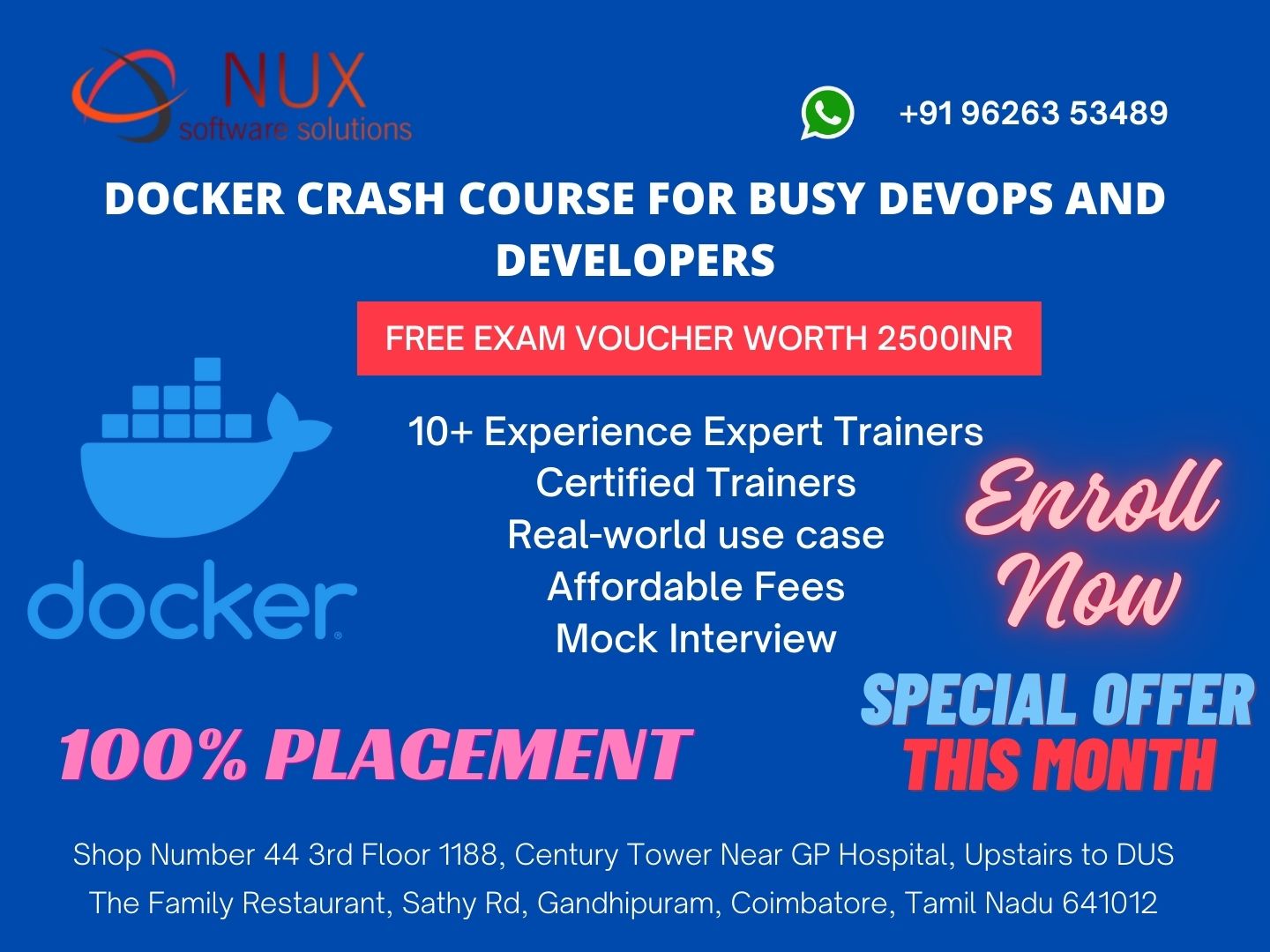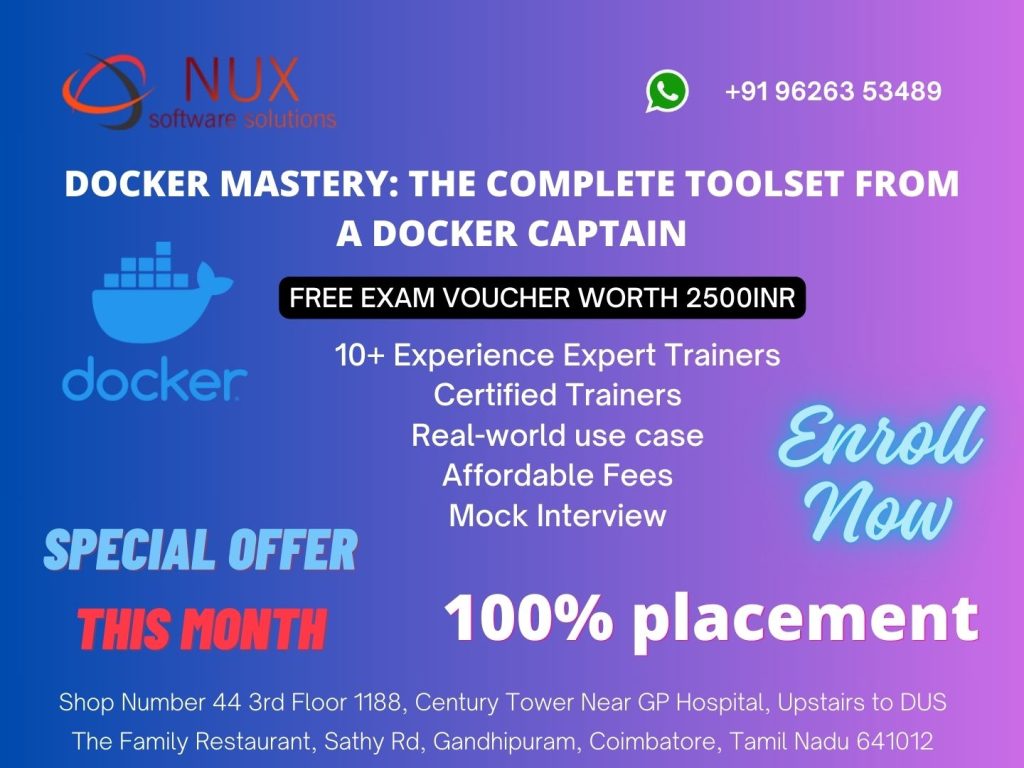Docker Crash Course for busy DevOps and Developers

Course Overview
The Docker Crash Course for Busy DevOps and Developers is a fast-paced, hands-on training program designed to help professionals master Docker fundamentals in record time. This course is tailored for developers, system administrators, DevOps engineers, and tech enthusiasts who want to integrate containerization into their workflow without spending weeks learning.
By the end of this crash course, you’ll understand how Docker works, how to containerize applications, and how to build, manage, and deploy containers in real-world environments. Whether you’re working on microservices, automating deployment pipelines, or setting up CI/CD, this course will give you the essential skills to use Docker efficiently and confidently.
Why Take This Course?
In today’s fast-paced development world, Docker has become a core tool in modern DevOps practices. Containers streamline development, ensure consistency across environments, and accelerate deployment cycles. However, learning Docker can be overwhelming without the right guidance.
This crash course cuts through the noise and delivers only what you need — practical, real-world Docker usage with a focus on automation, reliability, and scalability. It’s ideal for those with limited time but a strong desire to upskill rapidly.
Who This Course is For
-
DevOps Engineers who need to build and manage containerized environments.
-
Backend and Full-Stack Developers looking to containerize applications for easier deployment.
-
System Administrators managing server infrastructure and deployment pipelines.
-
Software Architects adopting microservices architecture.
-
Tech Leads & Engineering Managers overseeing development and deployment processes.
-
Anyone with basic Linux/CLI skills wanting to fast-track their Docker learning.
Key Learning Outcomes
By completing this crash course, you will:
-
Understand what Docker is and how it works.
-
Learn how to install and configure Docker on any system.
-
Master the use of Docker CLI for image and container management.
-
Containerize simple to complex applications.
-
Write efficient and reusable Dockerfiles.
-
Use Docker Compose for multi-container applications.
-
Understand Docker networking, volumes, and image layers.
-
Deploy containers in real-world scenarios (dev/staging/production).
-
Gain insights into container best practices and performance optimization.
Practical Approach
This course emphasizes hands-on learning with real project-based exercises. You won’t just learn theory — you’ll apply your skills to build, test, and run containers just like you would on the job. Each module includes practical tasks that simulate real-world DevOps workflows.
Course Benefits
-
Time-efficient: Designed for busy professionals — learn in just a few hours.
-
Straightforward: No unnecessary theory, just what you need to know.
-
Real-world focused: Skills you can apply immediately in your projects.
-
Portable knowledge: Use what you learn in any cloud or on-premise environment.
-
Career-boosting: Add an in-demand skill that’s essential for DevOps and modern development.
Why Docker?
Docker has revolutionized the way applications are built, shipped, and run. Containers are lightweight, fast, and portable — ideal for modern DevOps and microservices architecture. As organizations continue to move towards containerization, Docker has become a must-have skill for professionals in tech.
Learning Docker can help you:
-
Reduce environment-specific bugs
-
Simplify deployment and scaling
-
Increase productivity and collaboration
-
Prepare for orchestration with Kubernetes and cloud-native tools
Conclusion
The Docker Crash Course for Busy DevOps and Developers is the ultimate time-saving course to get you up and running with Docker. Whether you’re managing infrastructure, coding backend services, or deploying applications in production — this course gives you the Docker knowledge you need without the fluff.
Don’t let a lack of time stop you from learning one of the most essential tools in modern software development. Join today and level up your DevOps game with Docker in just a few hours.
Docker Crash Course for busy DevOps and Developers Syllabus
Modules
CHAPTER 1 :
Introduction
Three Ways – Containers, VMs and Bare Metals
Whats under the hood – Namespaces, Cgroups and OverlayFS
Portability, Density, Consistency – The Key Features of Docker
The Docker Evolution Story
Docker Workflow and Components
CHAPTER 2 :
Setting up the Environment
Option 1: Docker for Mac/Windows
Option 2: Using Docker Toolbox
Option 3: codespaces.io
CHAPTER 3 :
Introduction
Testing Waters with Docker
Launching our first Container
Launching Container Like a VM with Interactive Mode
Namespaces in Action – Learning Whats contained and whats not
Making Containers Persist
Connecting to a Running Container
Pause, Stop Remove
Lab: Getting Started with Docker (Offline)
CHAPTER 4 :
Introduction
Port Mapping Primer – Launching and Connecting to a Web Application
Renaming, Top, Attaching and Detaching
Inspecting Containers and Foregrounding
Limiting Resources – Memory
Prioritising CPU Utilisation
CHAPTER 5 :
Introduction
How to package an application into a Docker Image
Building Docker Image the Imperative Way
Launching and customizing a Container
Committing the container into an Image and Validating
Troubleshooting Image Builds, Publishing to Docker Hub
Automating Image builds with a Dockerfile
Image build cache, Dangling Images, Image Tagging
Testlab Openshift
CHAPTER 6 :
Introduction
Docker Host Networking Primer
Inspecting the default Bridge
Creating Networks – Bridge, None and Host
Multi Host Networking and Overlay
CHAPTER 7 :
Introduction
Compose Primer Launching Redis Container
Using Container Linking to connect Services
Creating Docker Compose Specifications
Launching Application Stack with Docker Compose
CHAPTER 8 :
Introduction
Need for and key features of Container Orchestration Engine
Docker Swarm Key Concepts
Provisioning 5 nodes Swarm cluster with 3 managers and 2 workers
Provisioning a high available replicated Service manually
Extending docker compose to deploy in Production with stack deploy
Adding deploy and replication configuration for voting app
Container and Node fault tolerance in action with Swarm
Zero Downtime Deployment and Rolling Updates
CHAPTER 9:
Why kubernetes
Launching a kubernetes cluster on Google Cloud Platform
Deploying and publishing frontend app on GKE
High Availability and Release Strategies with Deployments
Publishing Applications with Services
Pods – unit of deployment
When to run more than one container in a pod ?
Kubernetes Internal Service Discovery
Assignment – Deploy application for shopping cart
Solution – Carts Application Deployment
Scaling applications manually and with auto scaler
Zero Downtime Deployment
Quick dive into kubectl, a CLI client for kubernetes


